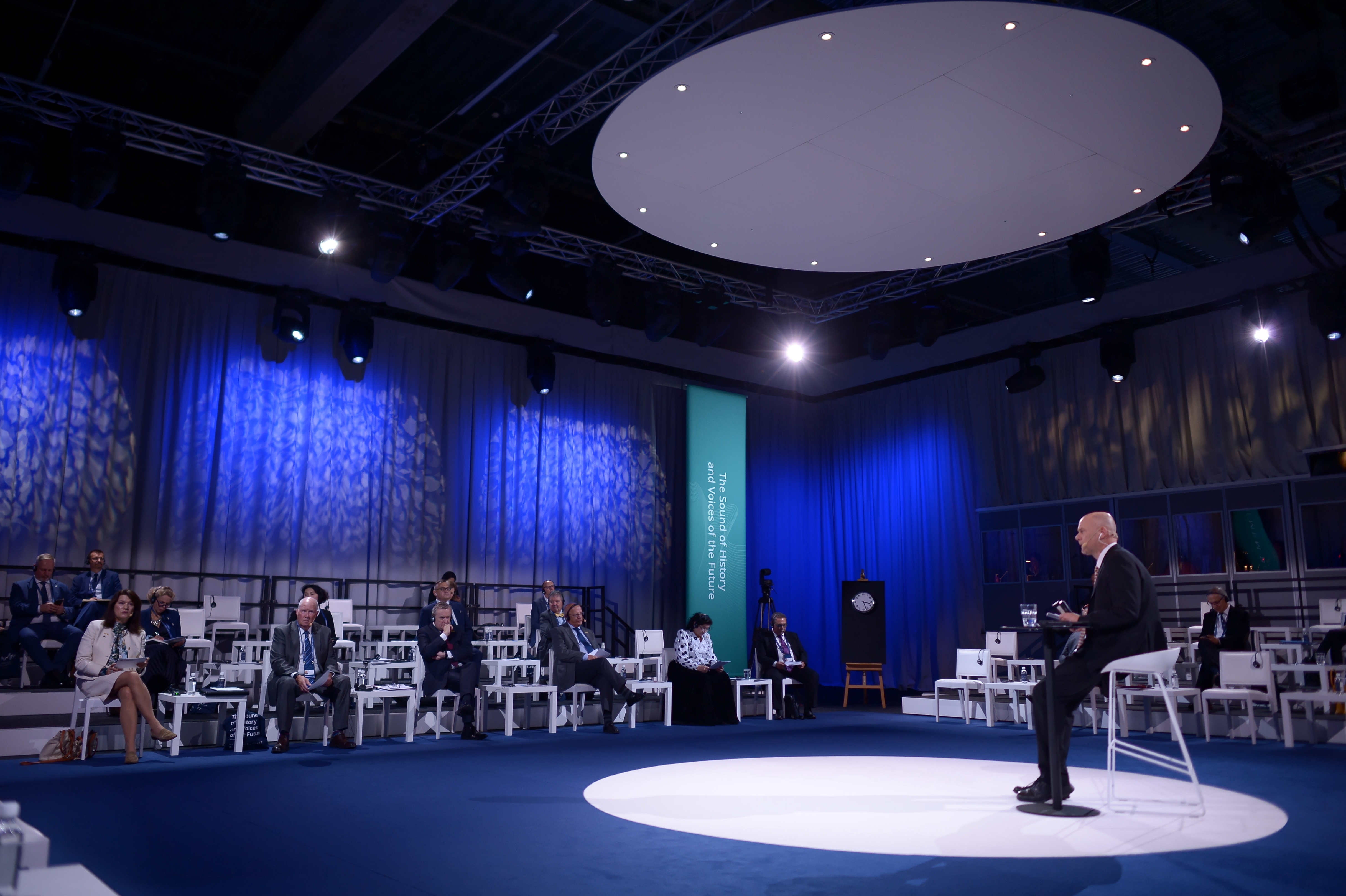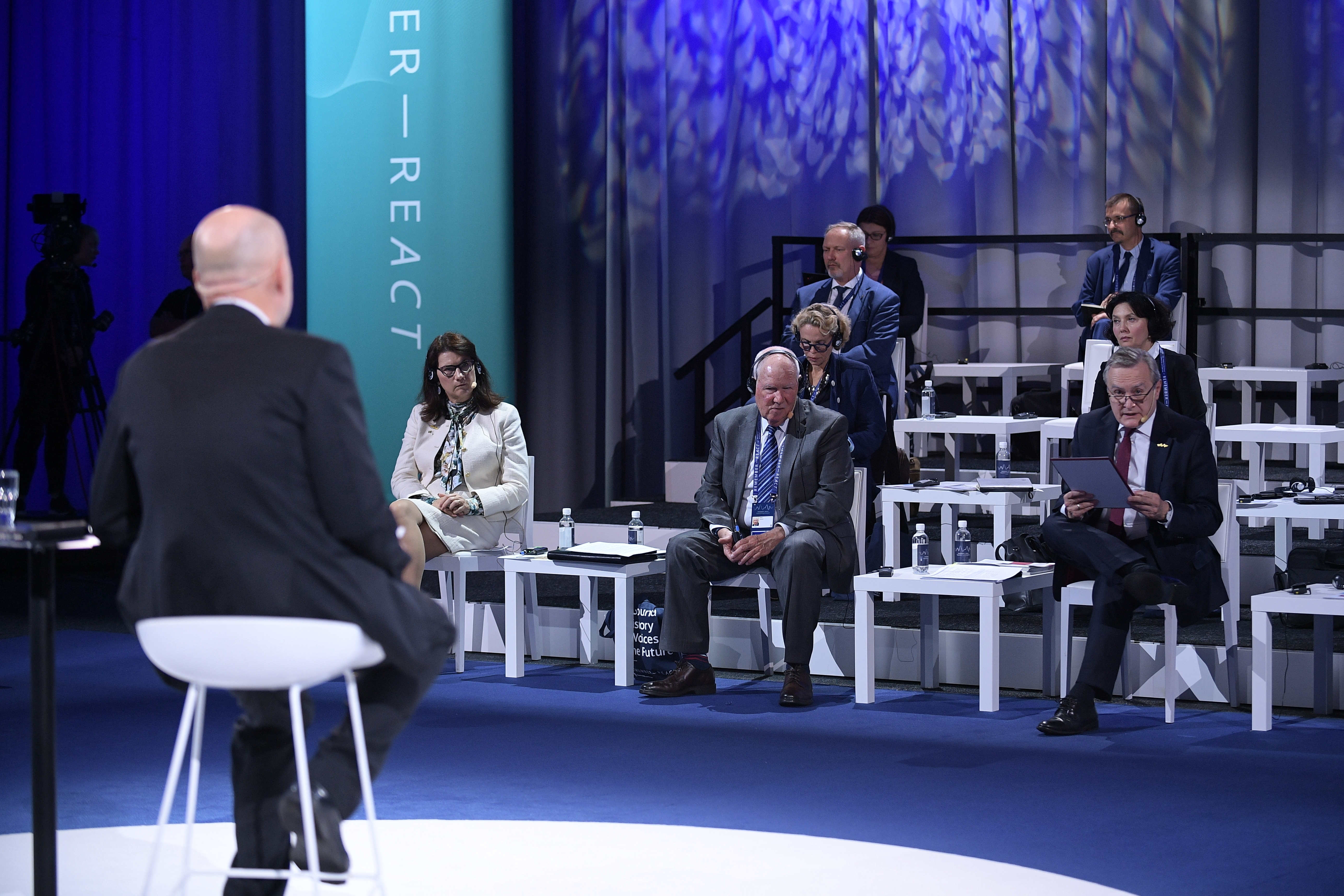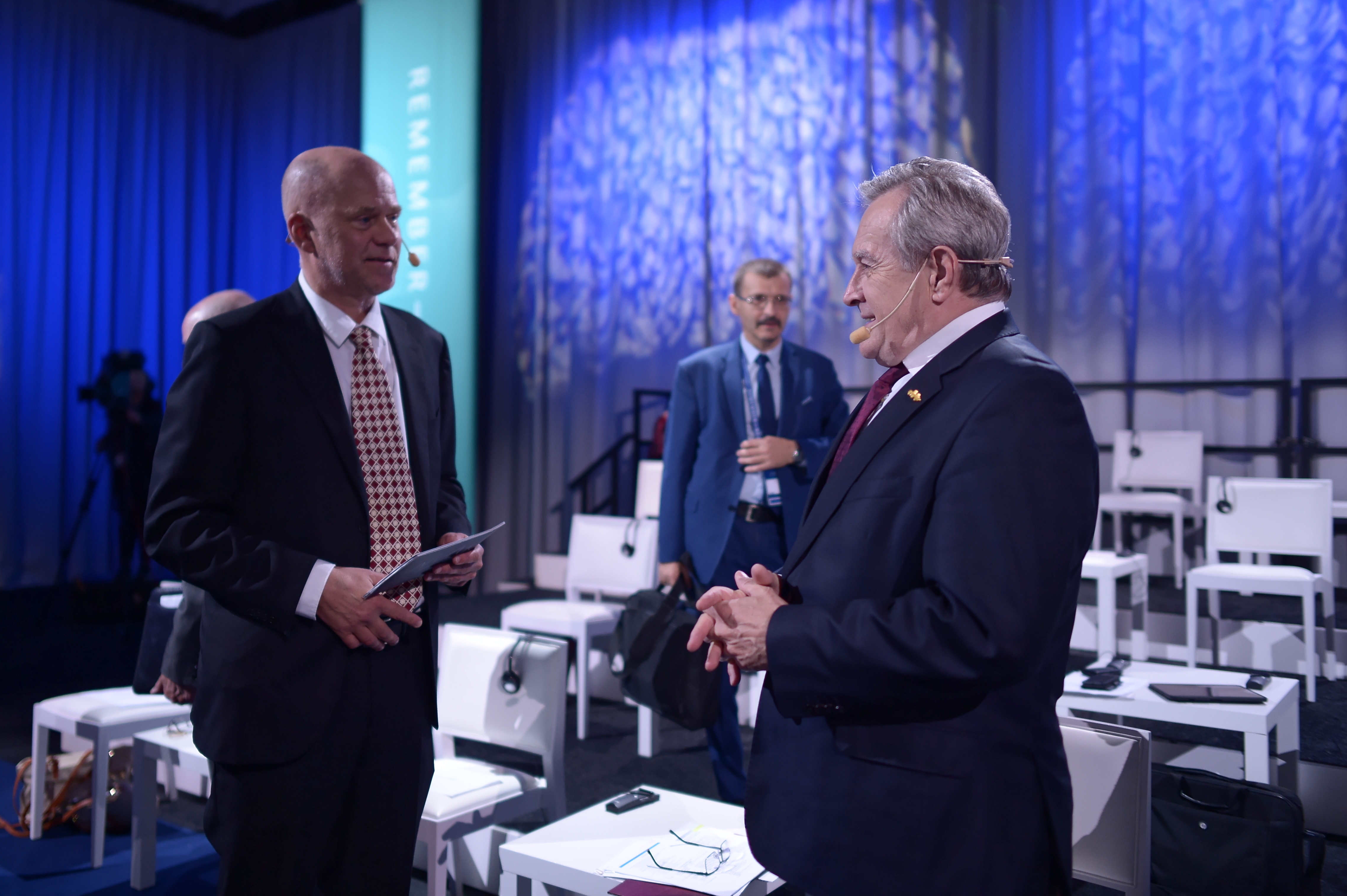Wystąpienie wicepremiera prof. Piotra Glińskiego na Międzynarodowym Forum Pamięci o Holokauście i Zwalczaniu Antysemityzmu w Malmoe
13.10.2021
„Polska sprzeciwia się i przeciwdziała wszelkim formom rasizmu i antysemityzmu. Podejmowane są liczne wysiłki, aby zapobiegać antysemityzmowi we wszystkich dziedzinach życia. Polska dąży do prawdy historycznej o II wojnie światowej i okupacji niemieckiej” – powiedział wicepremier prof. Piotr Gliński podczas swojego wystąpienia na Międzynarodowym Forum Pamięci o Holokauście i Zwalczaniu Antysemityzmu w Malmoe.

Wicepremier Piotr Gliński, który wystąpił podczas sesji na temat wdrażania strategii i planów działania w walce z antysemityzmem oraz zapewnienia bezpieczeństwa osobom należącym do mniejszości dotkniętych antysemityzmem oraz innymi formami rasizmu i nietolerancji, przypomniał słowa premiera RP Mateusza Morawieckiego, skierowane dwa lata temu do Isaaca Herzoga, prezesa zarządu Agencji Żydowskiej dla Izraela, obecnie prezydenta Izraela:
„Polska pozostaje zaangażowana w zwalczanie wszelkich form antysemityzmu. Potępiamy wszelkie akty przemocy wobec członków społeczności żydowskich czy ataki na miejsca kultu. Jesteśmy dumni, że Polska pozostaje bezpiecznym domem dla naszych żydowskich rodaków”.
Wicepremier Piotr Gliński przypomniał również, że to Polska była krajem, który od pierwszego dnia II wojny światowej walczył z hitlerowskimi Niemcami i poniósł ogromne ofiary.
Pod bezlitosną okupacją niemiecką Polakom udało się stworzyć największą armię podziemną oraz działające podziemne państwo i rząd. Jednym z jej priorytetów była pomoc i ratowanie Żydów. Polska podjęła nadzwyczajny wysiłek, aby poinformować świat o trwającej masowej eksterminacji Żydów i desperacko wzywała pomocy. Tego wołania świat zachodni świadomie nie usłyszał, pomimo największych poświęceń niezliczonych polskich i żydowskich bohaterów, takich jak Szmul Zygielbojm, Witold Pilecki, Irena Sendlerowa, Jan Karski – by wymienić tylko kilku” – powiedział wicepremier.
Prof. Gliński podkreślił również, że Polska nie tylko wprowadziła akty i zalecenia międzynarodowe dotyczące przeciwdziałania antysemityzmowi i rasizmowi, ale przygotowała i wdrożyła własne systemowe działania.
Wystąpienie wicepremiera i ministra kultury, dziedzictwa narodowego i sportu prof. Piotra Glińskiego (cały tekst)
Your Excellencies, Distinguished Guests,
“Poland remains committed to combating all forms of antisemitism. We condemn all acts of violence against members of Jewish communities or attacks on the places of worship. Therefore, we are proud that Poland remains a safe home for our Jewish compatriots.” These are the words of Polish Prime Minister Mateusz Morawiecki who wrote to Isaac Herzog, Chairman of the Executive of the Jewish Agency for Israel, currently the President of Israel, two years ago.
Poland fought against Nazi Germany since the first day of the World War Two and made enormous sacrifices. Under the merciless German occupation Poles managed to establish the biggest underground army and an operational underground state and government. One of its priorities was helping and saving the Jews. Poland made priceless effort to inform the world about the ongoing mass extermination of Jews and desperately called for help. A call that deliberately wouldn’t be heard by the Western World, despite the highest sacrifices of uncounted Polish and Jewish heroes such as Szmul Zygielbojm, Witold Pilecki, Irena Sendler, Jan Karski, to mention a few. Today, Poland maintains its constant opposition to all forms of racism and antisemitism. Numerous efforts are being made to prevent antisemitism in all areas of life. Moreover, Poland strives for historical truth about the World War Two and German occupation.
To foster our efforts, we have elaborated national strategies and plans as well as introduced international acts and recommendations. In 2016 Poland, as a member of International Holocaust Remembrance Alliance, acknowledged the working definition of antisemitism. Since 2009, the Polish Police has been implementing the Law Enforcement Officer Programme on Combating Hate Crime and, consequently, Training Against Hate Crimes for Law Enforcement. Both programms focus on ensuring safety to everyone who may be a potential victim of hate crimes. By 2019, a total of over 100 thousand officers, that is practically the whole headcount, completed this training.
We have also implemented Polish Police Action Plan in the field of counteracting the propagation of fascism and other totalitarian regimes as well as hate crimes based on national, ethnic, racial or religious differences. In result, the number of hate crimes motivated by antisemitism has been gradually reduced since 2018.
Education and raising awareness about Holocaust is another key priority of Poland. Knowledge on atrocities of the World War Two, with particular focus on the Holocaust, is included in the compulsory curricula of history classes beginning from elementary schools. The Polish Minister of Education has recently introduced an initiative named “Get to Know Poland” addressed to Polish schools, teachers and pupils. All schools will receive additional funds to organize trips to museums, memorial sites, and cultural institutions – the list includes also Holocaust memorial sites and museums focusing on Jewish culture. Two years ago we also started our cooperation with the President of the World Jewish Congress Mr Ronald S. Lauder with the aim of co-producing a film that would rise an awareness of the Holocaust among youngsters in Polish school.
Poland – a country that witnessed both a thousand-year-old history of peaceful coexistence of Poles and Jews and a painful Holocaust done by the Nazi German in our territory – has an obligation to upkeep the memory, safeguard and care for this legacy.
Therefore, every year we witness an increasing number of institutions, organisations and their valuable projects devoted to memory, life and culture of Jews in Poland. There are many completed commitments and pledges by Poland that could help us in keeping the memory alive, such as revitalized memorial sites, new museums, expositions and visitor centers, such as the Warsaw Ghetto Museum (established by our Ministry in 2018), new museum in Sobibór, Treblinka, Gross-Rosen, Plaszow and Auschwitz-Birkenau. Since 2017 we have also elaborated and implemented – first time after the War - a very extensive program of identifying and marking 1200Jewish cemeteries on the Polish territory. The historical Jewish graveyards are under a special protection by Polish law.
In the last four years the Polish Ministry of Culture invested a lot into projects related to Jewish history, life and culture. Just to mention:
- 100 million dollars spent on subsidies for museums and cultural institutions;
- Over 25 million dollars spent for the endorsement to protect the largest Jewish cemetery in Poland, in Okopowa street, Warsaw;
- Over 41 million dollars spent for film productions, for example; films concerning the story of Zygielbojm, Nowak-Jeziorański or Pilecki;
- And also hundreds of concerts, performances, meetings, publications were made possible thanks to support from the Polish State.
These are just some examples on how Poland contributes to the remembrance, saving memory and promotion of Jewish life in culture. Thanks to our efforts we may witness a stable reduction of number of Anti-Semitic incidents in Poland. That trend is even more visible if we compare it to the numbers and trends in the major European actors, as Germany, France, United Kingdom or Sweden. We also witness an increase in the number of Poles that have a positive attitude towards Jews.
Thank you for your attention.



